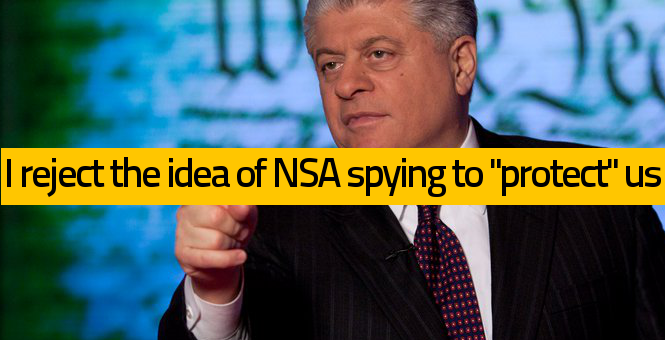April 4, 2014
By Judge Andrew Napolitano
 What if the National Security Agency (NSA) knows it is violating the Constitution by spying on all Americans without showing a judge probable cause of wrongdoing or identifying the persons it wishes to spy upon, as the Constitution requires? What if this massive spying has come about because the NSA found it too difficult to follow the Constitution?
What if the National Security Agency (NSA) knows it is violating the Constitution by spying on all Americans without showing a judge probable cause of wrongdoing or identifying the persons it wishes to spy upon, as the Constitution requires? What if this massive spying has come about because the NSA found it too difficult to follow the Constitution?
By Judge Andrew Napolitano
 What if the National Security Agency (NSA) knows it is violating the Constitution by spying on all Americans without showing a judge probable cause of wrongdoing or identifying the persons it wishes to spy upon, as the Constitution requires? What if this massive spying has come about because the NSA found it too difficult to follow the Constitution?
What if the National Security Agency (NSA) knows it is violating the Constitution by spying on all Americans without showing a judge probable cause of wrongdoing or identifying the persons it wishes to spy upon, as the Constitution requires? What if this massive spying has come about because the NSA found it too difficult to follow the Constitution?
What if the Constitution was written to keep the government off the people’s backs, but the NSA and the president and some members of Congress have put the NSA not only on our backs, but in our bedrooms, kitchens, telephones and computers? What if when you look at your computer screen, the NSA is looking right back at you?
What if the NSA really thought it could keep the fact that it is spying on all Americans and many others throughout the world secret from American voters? What if Congress enacted laws that actually delegate some congressional powers to elite congressional committees — one in the Senate and one in the House? What if this delegation of power is unconstitutional because the Constitution gives all legislative powers to Congress as a whole and Congress itself is powerless to give some of its power away to two of its secret committees? What if the members of these elite committees who hear and see secrets from the NSA, the CIA and other federal intelligence agencies are themselves sworn to secrecy?
What if the secrets they hear are so terrifying that some of these members of Congress don’t know what to do about it? What if the secrecy prohibits these congressional committee members from telling anyone what they know and seeking advice about these awful truths? What if they can’t tell a spouse at home, a lawyer in her office, a priest in confessional, a judge when under oath in a courtroom, other members of Congress or the voters who sent them to Congress?
What if this system of secrets, with its promises not to reveal them, has led to a government whose spies have intimidated and terrified some members of Congress? What if one member of Congress — Sen. Jay Rockefeller, a Democrat from West Virginia — wrote to then-Vice President Dick Cheney and voiced fears that totalitarianism is creeping into our democracy? What if he wrote that letter in his own hand because he feared he might be prosecuted if he dictated it to a secretary or gave it to his secretary for typing? What if he was terrified to learn what the spies told him because he knew he could not share it with anyone or do anything about it?
What if the NSA’s chief apologist in Congress — Sen. Dianne Feinstein, a Democrat from California — took to the only safe place in the world where she could reveal what she learned from the spies and not be prosecuted for violating her oath of secrecy and there revealed a secret? What if that place is the Senate floor, and what if, while there, she revealed that she approved of the NSA spying on all Americans but disapproved of the CIA spying on her staff? What if it is unlawful and unconstitutional for the CIA to spy on anyone in the United States — whether private citizen, illegal alien or member of a Senate staff?
What if the equality of the branches of government is destroyed when one of them spies on the other? What kind of a president spies on Congress? What kind of members of Congress sit back and let themselves become victims of spying? What if Congress could stop all spying on all Americans by a simple vote? What if Congress could stop the president from spying on its own members with a simple vote? What if Congress is afraid to take these votes? READ MORE…